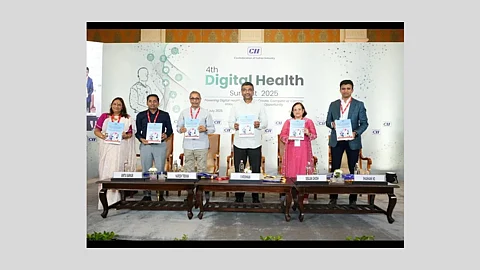

The Confederation of Indian Industry (CII) convened the 4th Digital Health Summit 2025 on 25th July 2025, under the compelling theme: “Powering Digital Health: Will India Create, Compete or Comply – Unlocking the $40 Billion Opportunity.” The summit brought together key stakeholders from the government, industry, academia, and startups, aiming to shape India’s trajectory in the global digital health ecosystem.
The discussions centered around India’s potential to transition from being a technology adopter to a global frontrunner by creating world-class digital health solutions, competing on international standards, and influencing global frameworks rather than merely aligning with them. Key focus areas included the investment landscape, policy enablers, and collaboration models essential to unlocking a projected $40 billion digital health economy over the next decade.
S. Krishnan, Secretary, Ministry of Electronics and Information Technology, highlighted India’s digital transformation in healthcare, emphasizing the need for scalable, indigenous tech solutions that reach the last mile while maintaining high standards of care. He called for sustained cross-sector collaboration to drive forward the digital health vision.
Dr. Naresh Trehan, Chairman, CII Steering Group on Health and CMD, Medanta – Medicity, spoke on the evolution of healthcare technology in India—from advanced imaging tools to robotic surgery—and underscored the importance of continuous learning and unlearning to adapt to rapid innovation. He stressed that embracing new technologies is vital for achieving universal health coverage.
Shashank ND, Co-chairman, CII National Committee on Health Technology and CEO of Practo, advocated for aligning capital with outcomes and building innovation hubs. He pointed out that India’s vast digital infrastructure, engaged user base, and startup ecosystem provide a strong foundation for global leadership in digital health, especially if supported by enabling regulations and improved market access.
Ms. Debjani Ghosh, Distinguished Fellow at NITI Aayog’s Frontier Technologies Hub (FTH), presented the transformative role of frontier technologies in healthcare. She emphasized the importance of preparedness and public-private collaboration in leveraging these shifts to extend both lifespan and healthspan. “Trust, inclusion, and scale have powered India’s digital health journey; the next phase is to scale with trust and purpose,” she said.
Vishal Bali, Executive Chairman, Asia Healthcare Holdings, highlighted the need for a comprehensive health vision that integrates primary care, noting current gaps in schemes like Ayushman Bharat. He called for capability-building to meet the increasing demand for healthcare services.
Dr. Rajeev Singh Raghuvanshi, DCGI, stressed the role of self-regulation and structured stakeholder dialogue in digital health. He cited MedTech Mitra, developed with NITI Aayog, ICMR, and CDSCO, as a successful example of collaborative regulatory engagement that could serve as a model for future scaling efforts.
Madhukar Kumar Bhagat, Joint Secretary, Ministry of Health and Family Welfare, reiterated that technology is a means to achieve universal health coverage, and must enhance the four pillars of care: availability, accessibility, affordability, and quality. He called for purpose-driven AI integration.
Kiran Gopal Vaska, Joint Secretary at the National Health Authority and Mission Director, Ayushman Bharat Digital Mission (ABDM), emphasized embedding regulatory compliance within digital health systems. By digitizing compliance frameworks and enabling real-time monitoring, he suggested that regulation could become an enabler, not a barrier, to scale.
As part of its commitment to workforce wellbeing, CII launched a report titled “Workplace Health Reimagined: Corporate India’s Readiness for Digital Health Leadership,” spotlighting how businesses can lead the way in promoting employee wellness through digital solutions.
The summit emerged as a powerful platform to drive forward India’s digital health aspirations—fostering innovation, enabling public-private partnerships, and aligning regulations to create a resilient, inclusive, and globally competitive digital health ecosystem.